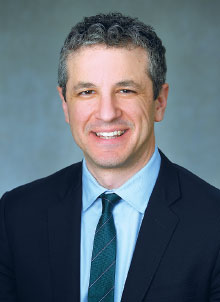When the pandemic shuttered the community health clinic she attended in Puget Sound, a patient with bipolar disorder began struggling. She started to frequent the emergency room to connect with care, since her insurance didn’t cover behavioral health.
After a visit with her primary care physician (PCP), she was offered treatment through its collaborative care program. She now receives therapy from a behavioral health case manager and medication from her PCP, overseen by psychiatrist Nicholas Tamoria, M.D., regional medical director for Behavioral Health and Psychiatry at The Everett Clinic, part of Optum. “This patient was able to achieve stability because of collaborative care. She is so happy about the care she’s receiving and is able to stay out of the emergency room because her care needs are being met,” he said.
There is growing evidence that the collaborative care model (CoCM) can work for patients beyond those with depression and anxiety: A recent study in JAMA Psychiatry included more than 1,000 patients with posttraumatic stress and/or bipolar disorder. Half were enrolled in a CoCM program and treated by a care manager and PCP, with ongoing consultations provided by an offsite psychiatrist.
Participants taking part in collaborative care were found to have large, clinically meaningful improvements in mental health functioning, as well as greater perceived access to care and fewer medication side effects. What’s more, patients enrolled in CoCM needed fewer visits with psychiatrists than the other treatment group.
The study “demonstrates that CoCM can effectively manage more complex [psychiatric] disorders just as well as referring to a specialist,” lead author John C. Fortney, Ph.D., the director of the Division of Population Health and a professor of psychiatry and behavioral sciences at the University of Washington’s School of Medicine, told Psychiatric News. “Second, it adds to the small evidence base that CoCM can be delivered through a virtual care team using video visits. In other words, members of the CoCM team do not need to be physically located together.”
Tamoria said the move to collaborative care has allowed The Everett Clinic, which accepts most major health plans in its region, to offer access to patients who could not otherwise obtain mental health care directly from a specialist. It began implementing CoCM one year ago and has since expanded its program to nine pediatric and primary care clinics.
Penn Finds CoCM Invaluable
In place for nearly four years, the CoCM program at the University of Pennsylvania’s Penn Medicine receives a constant flow of referrals and consistently achieves 40% to 45% remission rates for depression and anxiety, as measured by participants’ PHQ-9 and GAD-7. Clinicians have made more than 1,000 “suicidal catches,” connecting patients who were at risk for suicide with collaborative care.
“For us to see this real-world impact on mental health outcomes, similar to what was shown in more controlled settings, has been a great success—as well as a motivation for us to continue to grow the program,” said Matthew Press, M.D., M.Sc., physician executive of Penn Primary Care and an associate professor of general internal medicine at the University of Pennsylvania.
“We tell our primary care clinicians, ‘Refer anyone you’re concerned about, for any mental health concern,’ ” Press explained. “We’ve kept the initial net as wide as possible; we triage and direct patients to either collaborative care or specialty mental health care, depending on their needs.” Penn Medicine’s CoCM program has now grown to 15 of its 90 primary care practices as of last September, and the plan is to keep expanding. “This model has allowed us to take this really scarce resource of psychiatry and expand its reach.”
One early challenge in getting the program off the ground was building an entirely new documentation system for its electronic health record system (EHR). Press hopes that going forward, EHR vendors will begin creating off-the-shelf modules that have built-in support for CoCM. “For better or worse, nothing new can happen in health care without first going through the EHR.”
Penn Medicine covered some of its implementation costs through a program called CPC+ from the Centers for Medicare and Medicaid Services (CMS), but it has been able to sustain the program by billing the CoCM CPT codes launched in 2017. Still, cost concerns have slowed down expansion of the model.
“There is an upfront cost until the practice and care manager are fully up and running—and able to bill. When you multiply that across multiple practices, it adds up,” he said. “To help scale CoCM nationally, it will be important for payers, government, and employers to help with the upfront costs until the practices get to a point of sustainability.”
Despite the challenges, Press said the staff continually hear from primary care physicians who are thankful to have this program. “We didn’t realize how much the lack of access to mental health care for patients was impacting our physicians and contributing to their burnout,” Press said. “It was like our primary care clinicians were alone at sea, trying to manage a tidal wave of mental health issues without support. This program has provided them a life raft. We could never take this program away.”
AdventHealth Pilot: CoCM Success
AdventHealth, a health system with more than 40 hospitals and 130 facilities, is reporting “resounding success” from a virtual collaborative care pilot it recently wrapped up in two of its markets, Penny Jonnson, president and CEO for AdventHealth’s Southwest Region and Texas Health Huguley Hospital, told Psychiatric News. One of the two locations had no in-house psychiatrist and few mental health care options. Johnson said the organization launched the six-month pilot after deciding they needed to do more to address the mental health needs of its employees as well as patient populations.
With the bulk of its nearly 6 million annual patient encounters taking place in its primary care clinics, the health system decided on CoCM as a way of reaching the largest swath of patients the quickest, Johnson explained. The health system contracted with a vendor, Concert Health, for its virtual CoCM program and at the end of the pilot assessed the clinical, financial, and patient satisfaction outcomes.
Because of the pilot, some 86,000 patients who visited the PCP in those two markets took the PHQ-9 as part of their check-in process, she said. Patients can decline being screened, but the use of an app called Phreesia in some locations to administer the PHQ-9 as part of the check-in process has been a “game changer” in improving their screening rate. The app allows patients to check in on their personal devices before they arrive at the clinic, and the PHQ-9 pops up as part of the process. The app makes it harder for patients to ignore than the paper-and-pencil forms that can be set aside easily, Johnson said.
One lesson learned in the pilot was the importance of having both a physician and an executive “champion” in each of the locations, who could serve to coax reluctant PCPs to embrace the change and inform them how well accepted virtual mental health care can be, she added. The program has been more financially successful in some markets than others. Some states, such as Florida, do not pay for collaborative care codes within their state Medicaid programs, nor do some Blue Cross plans in North Carolina, Johnson explained. “All of us should continue to advocate for this with our state legislatures. Mental health is just health. How can they not cover this?”
About 1% of patients score in the “severe depression” range, so Johnson estimates that the program caught more than 80 patients who were at risk of harming themselves just in the first six months of operation. Furthermore, primary care clinics referred 2,000 patients for mental health treatment that didn’t previously have access. An impressive 57% agreed to enroll and receive help, she added. Average improvement among participants was 45% in 90 days. The pilot also met its goal of training 100 physicians in the model.
“I’ve worked for this company for more than 20 years, and I’ve never seen us do something that’s been so successful in so many ways,” Johnson said. “Our providers are excited, our patients are excited, and you can really see life-changing work happening.” ■
Information on APA’s free training for psychiatrists on the collaborative care model is posted
here.



